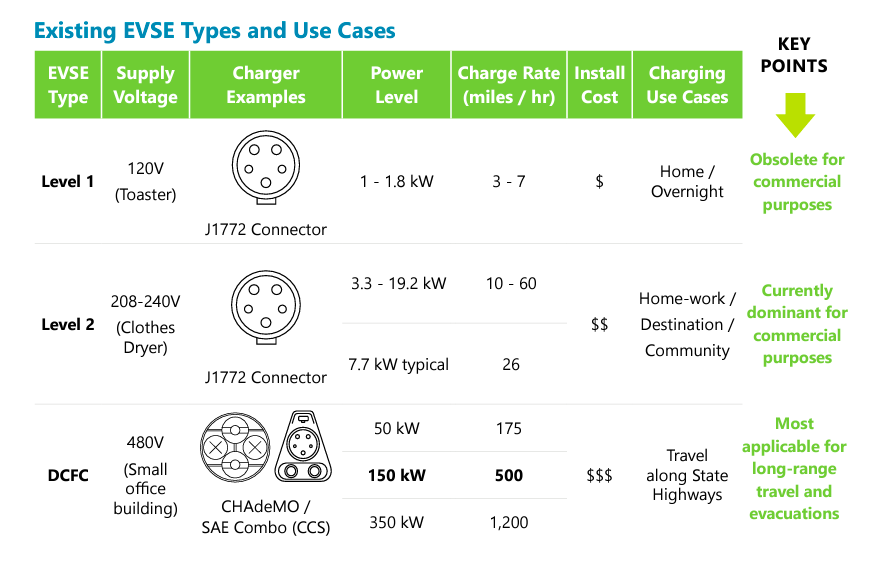How to Switch To An Electric Car in Georgia
A guide for Georgians interested in purchasing an electric vehicle

The Basics Of Electric Vehicles: Different Types
The two main types of plug-in electric vehicles are plug-in hybrids (PHEVs) and battery electric vehicles (BEVs).

Learn About the Benefits of Electric Cars vs. Gas-Powered
Lower fuel costs, lower ownership costs, and significant emissions reductions are some benefits Georgians will realize with EVs.

How Long Does It Take To Charge Electric Vehicles?
We review a traditional 110V outlet and a charging cord plugged into the car, as well as charging stations.

How Much Will An Electric Vehicle Cost In Electricity vs. Gasoline?
When using DC fast-charging stations the cost of the electricity does vary. It can range between $.30 and $.40 per kWh.

Where Can I Charge My Electric Vehicle in Georgia and Beyond?
Georgians can charge at home, on the go, or at a public charging station. Here is how to charge electric vehicles in Georgia.

How Far Can I Drive With An Electric Vehicle Before Recharging?
How far electric vehicles can travel before needing recharging depends on the size of the electric car's battery pack.

Are There Drawbacks To Consider With Electric Vehicles?
Switching to an electric car requires a paradigm shift on how we think and plan for fueling our vehicles.

What Are Common Misconceptions About Driving An Electric Car?
Make an informed decision about making the switch to an electric vehicle based on the facts and your lifestyle.

Are There Tax Credits Or Incentives For Electric Vehicles?
Learn more about the tax credits and other savings available for both individuals and communities in Georgia.

Is Driving an Electric Car Better For The Environment?
Electric vehicles emit almost 70% fewer GHG emissions annually compared to gasoline vehicles.

Other Resources: Learn More About Electric Vehicles in Georgia
Interested in learning more? There are many great resources about electric vehicles that you can explore.

Quiz: How Much Do You Know About Electric Vehicles?
Test your knowledge. Take this five-question quiz to determine how much you know about Elective Vehicles.

Watch a Webinar About Switching to an Electric Car
Watch Dory Larsen, co-author of this toolkit, give a presentation about how and why to upgrade to an EV.
The Basics Of Electric Vehicles
.png)
What Are The Benefits Of Electric Cars Over Gas-Powered Cars?
- Lower lifetime ownership costs. Typical drivers save $6,000 to $10,000 over the life of the vehicle, versus owning a comparable gas-powered vehicle. This is largely due to lower fueling and maintenance costs. There are no oil changes with an EV and there is less scheduled maintenance because of the simplicity and fewer moving parts with an electric motor.
- Fueling costs are much lower. It costs about $35-40 to drive 1,000 miles on electricity (which is an average month’s worth of driving). Gasoline costs are much higher than that and fluctuate widely due to economic volatility.
- Time savings and convenience. There are no oil changes with an all-electric vehicle so you save time and money. Additionally, because they don’t use oil you never have to worry about oil stains on your driveway. With fewer moving parts, EVs require less maintenance than traditional Internal Combustible Engines (ICE vehicles). Also, powering them is easy, you can schedule to charge them at night while you’re sleeping or at a public charging station which are often found near amenities. So you can skip the pump and never have to worry about dirty gas tank handles.
- Superior efficiency. EVs are significantly more efficient than an internal combustion engine vehicle. The average fuel efficiency in the US is 25.7 miles per gallon. The fuel efficiency for most electric cars is over 100 MPGe. MPGe is the miles per gallon equivalent. So, what that means to a consumer is that you use less energy to get from point A to point B, and the cheapest fuel is the fuel you don’t use.
.png)
In an electric drive system about 80% of the electrons move the car down the road whereas with a conventional vehicle only about 12%–30% of the energy from the fuel is used to move it down the road.
.png)
- Superior technology and safety features. The quickest mass produced car in the world is a Tesla Model S but all electric vehicles have that powerful instant torque. Propulsion from an electric motor means EVs are smooth and a quiet drive, and they have to pass the same rigorous safety standards often with flying colors.
A plug-in hybrid vehicle can run on electricity and then switch to gas whereas an electric vehicle can only run on electricity.
A battery electric vehicle works by an electric motor that is powered by a rechargeable battery pack. The range that the vehicle can travel before being recharged depends on the size of the battery pack. An electric vehicle has a single-speed transmission so has instant acceleration and with no tailpipe and emits no direct emissions.
- Significant emissions reductions. The transportation sector is now the largest source of greenhouse gas (GHG) pollution in the United States. Transitioning to electric transportation systems will significantly reduce these GHG emissions. There are two types of emissions associated with transportation that come from the tailpipe when burning gasoline or diesel. The first are GHG emissions that exacerbate climate change. The second are criteria pollutants like nitrogen dioxide and sulfur dioxide. They cause human health issues and environmental problems too (like smog). Battery electric vehicles use no gasoline or oil, so there’s no need for an exhaust system and tailpipe to emit the toxic emissions a gasoline-fueled car produces.
How Long Does It Take To Charge Electric Vehicles?
.jpeg)
The second way to charge is called Level 2 charging and it allows you to add about 25-60 miles per hour. This method uses charging stations that you can find around town and some folks choose to install them in their home.
The third way to charge, DC Fast-Charging, is usually found along highways and allows you to quickly recharge approximately 80% of the battery in half an hour.

Notice the two different shapes of DC fast charger connectors. The CHAdeMO connector was used by Nissan but is being phased out to CCS. Additionally, Tesla has their own proprietary charging and the shape is the same for all levels of charging.
How Much Will An Electric Vehicle Cost In Electricity vs. Gasoline?
It costs about $31 dollars to drive 1,000 miles in an EV using home charging. To calculate those costs we use the standard conversion 33.7kW/h= 1 gallon. First, divide 33.7 by the fuel efficiency of an electric vehicle 120MPGe to get the kWh per gallon electrical equivalent. Then, multiply that number by the average cost of electricity $.11/kWh to get the cost per mile. Then we multiply by 1,000 miles, so it costs $30.89 to drive 1,000 miles on electrons.
33.7(kWh per gallon) / 120MPGe * $.11 * 1,000 miles = $30.89 to travel 1000 miles (electric).
It costs about $165 to drive those same 1,000 miles on gasoline. To arrive at these calculations we divide the cost of a gasoline per gallon $4.25 by average MPG 25.7 to get the cost per mile. Then we multiply by 1,000 miles, so it costs $165.37 to drive 1,000 miles on gasoline.
$4.25 / 25.7MPG * 1,000 miles = $165.37 to travel 1000 miles (gasoline).

Where Can I Charge My Electric Car in Georgia?
At Home, On The Go, Or At A Public Charging Station
Due to the convenience and low cost, 80% of EV charging is done at home. Charging a car at home is as simple as plugging into a 110V outlet using the charging cord that comes with the vehicle. To increase charging speed, some EV drivers choose to install a Level 2 charging station at their home. That requires an electrician to install a 240V outlet and the purchase of a charging station that can be bought at many stores including Amazon.
Around town, you can find community charging stations. These are mostly Level 2 and many are free for the electricity. However, most networked stations do require you to pre-register for the network and use a Radio Frequency Identification (RFID) card to activate the charging station.
When traveling longer distances you will need to charge at a DC fast charging station(s). The Alternative Fuel Data Center maintains a list of all the EV charging stations in the country so you can map your route ahead of your trip. Additionally, apps like Plugshare can be downloaded to your phone to help map routes and show charging stations. Tesla has a navigation system that shows you where and how long you’ll need to charge in the car’s display. Thus relieving the driver of premapping charging stations and concerns about charging station availability.
DC Fast Charging
When using DC fast charging stations the cost of the electricity does vary. It can range between $.30 and $.40 per kWh. Using the same formula as above it would cost
33.7(kWh per gallon) / 120MPGe * $.35 * 1,000 miles = $98.29 to travel 1000 miles (electric).
.png)
How Far Can I Drive With An Electric Vehicle Before Recharging?
The range that the vehicle can travel before being recharged depends on the size of the battery pack. The first generation electric vehicles introduced in 2011 had a median range of 68 miles before needing to be plugged in again. We’ve come a long way in the past decade and the median range for model year 2023 is 270 miles. The maximum range is now a whopping 516 miles on a single charge.
Use the Edmunds’ EV buying guide to compare the range of available models.
Are There Tax Credits Or Incentives For Electric Vehicles in Georgia?
Federal Incentives
The Inflation Reduction Act (IRA) included an EV federal tax credit program that began on January 1, 2023. Although originally intended to run through 2033, this EV tax credit expired on September 30, 2025, following the passage of the One Big Beautiful Bill (OBBB) in July 2025.
The OBBB also set an earlier expiration date for the Alternative Fuel Vehicle Refueling Property Credit, which provides a federal tax credit for installing an EV charger at your home or business. This tax credit will expire on June 30, 2026, instead of the original 2032 date.
Georgia Incentives
There are Georgia-specific incentives, too. For example, there is a tax credit available for businesses installing a charging station.
Georgia Power Incentives
Georgia Power also has a time-of-use electricity rate for residential customers that is targeted to EV owners. The rate incentivizes people to charge their electric vehicles overnight when demand for electricity is lower. They also provide a rebate for installing a charger at home or at a business.
Are There Any Drawbacks To Consider In Switching To An Electric Vehicle?
Switching to an electric vehicle requires a paradigm shift on how we think and plan for fueling our vehicles.
If you have an older first-generation model with a shorter range (say 100 miles), it does require you to plan for charging. Even with a longer range model, you will need to plan for charging on long road trips or overnight hotel stays. Fortunately, many hotels are adding in charging infrastructure.
When using some apps like Plugshare, if someone else is using the charging station you may drive up and realize that the charging stations are in use and have to wait for them to finish charging before you can access it. It does take more time to recharge when on a road trip than a typical gas station fill-up.
You will need to join a network to activate the charging stations. There are several networks: ChargePoint, EVgo, Blink, Electrify America to name a few and they each require you to sign-up to access their proprietary charging stations. This typically requires them having access to your credit card and either pre-paying or allowing access for payment when charging.
The cost of purchasing a new EV is not in alignment with a comparable internal combustion vehicle yet. However, costs are coming down and are projected to be at parity within the next few years. In addition, electric vehicles are subject to an annual licensing fee in Georgia. The annual fee is $213.70 for EVs. The fee only applies to plug-in hybrids if the vehicle has an alternative fuel license plate.
What Are Some Common Misconceptions About Driving An Electric Car?
They’re Slow: False, drivers associate an electric battery with what they know about hybrids (think Prius). However, single-speed transmission and instant torque mean an electric vehicle has mind-blowing quickness.
Short-Range: False, the average range for upcoming EV models is over 300 miles.
Not Enough Models: False, currently, there are 61 models of plug-in hybrid and full battery electric passenger duty vehicles. By 2026, another 96 models will be coming to market. To date, there has been $460B in global investment in EVs. There are also electric school and transit buses and medium and heavy-duty trucks.
More Expensive to Own and Operate: False, typical drivers save $6,000 to $10,000 over the life of the vehicle, versus owning a comparable gas-powered vehicle.
Just as Many Emissions with an EV as an Internal Combustion Vehicle: False, there is a misconception that an electric vehicle generates as many upstream emissions when making the electricity to power an EV as a gas-powered car. This is false. While the source of your electricity has an effect on the emissions of your electric vehicle, EVs in Georgia emit almost 70% fewer GHG emissions annually compared to gasoline vehicles. This is because electric vehicles are so much more efficient and our electricity grid is getting cleaner every day. On average in the U.S., a gasoline-powered car has to get 88 mpg to have the same GHG emissions benefits as an electric car. Also of note, these emissions reductions are improving every year as more renewable energy is added to the grid. So, EVs continue to get cleaner over their lifetime.
Is Driving an Electric Car Better For The Environment Than Driving a Gasoline-Powered Vehicle?
Absolutely, EVs in Georgia emit almost 70% fewer GHG emissions annually compared to gasoline vehicles. This is because electric vehicles are so much more efficient and our electricity grid is getting cleaner every day.
A recent study from Yale demonstrated that when looking at all emissions from cradle to grave, "the total indirect emissions from electric vehicles pale in comparison to the indirect emissions from fossil fuel-powered vehicles…..The supply chain for combustion vehicles is just so dirty that electric vehicles can’t surpass them, even when you factor in indirect emissions.”
Other Resources
Here are a few of our favorite resources to learn more about EVs in Georgia.
PlugStar from Plug in America is a fantastic resource for exploring light-duty vehicle options.
The Union of Concerned Scientists created the How Clean is Your Electric Vehicle tool to help you compare the climate impact of different models of plug-in hybrids and full electric vehicles.
Transportation Electrification in the Southeast is a report from SACE and Atlas Public Policy captures regional and state-specific growth in Alabama, Florida, Georgia, North Carolina, South Carolina, and Tennessee. The Georgia-specific page highlights how the Peach State is number one in per-capita charging infrastructure in the region.
Key findings from the report Retained Transportation Fuel Spending in the Southeast by SACE show that 73% of the $103 billion spent on gas and diesel leaks out of the region’s economies annually. EVs could do the same amount of work for $51.5 billion because electricity is cheaper and more efficient. Most electricity costs are local, so more than 70% of the money spent on electricity stays in the region's economies. If all the cars, trucks, and buses in Georgia were electric today, there would be an additional $8 billion circulating through the economy annually.
Upgrading to an electric lawnmower is another great way to reduce emissions. Learn more about the benefits of electric landscaping equipment.
Watch a Video
In this engaging and informative webinar session, toolkit co-author Dory Larsen gives an overview of the content in this toolkit and answers common questions like:
- What are the pros and cons of driving an electric vehicle?
- Is driving an EV really better for the environment?
- Are there any state or federal incentives for purchasing an EV?
You may also download Dory's slide deck, which includes links to useful resources.
Meet Our Experts
This toolkit was written by the experts at the Southern Alliance for Clean Energy.
Dory Larsen
Electric Transportation Program Manager
Southern Alliance for Clean Energy
Patrick King
Electronic Transportation Equity Manager
Southern Alliance for Clean Energy


